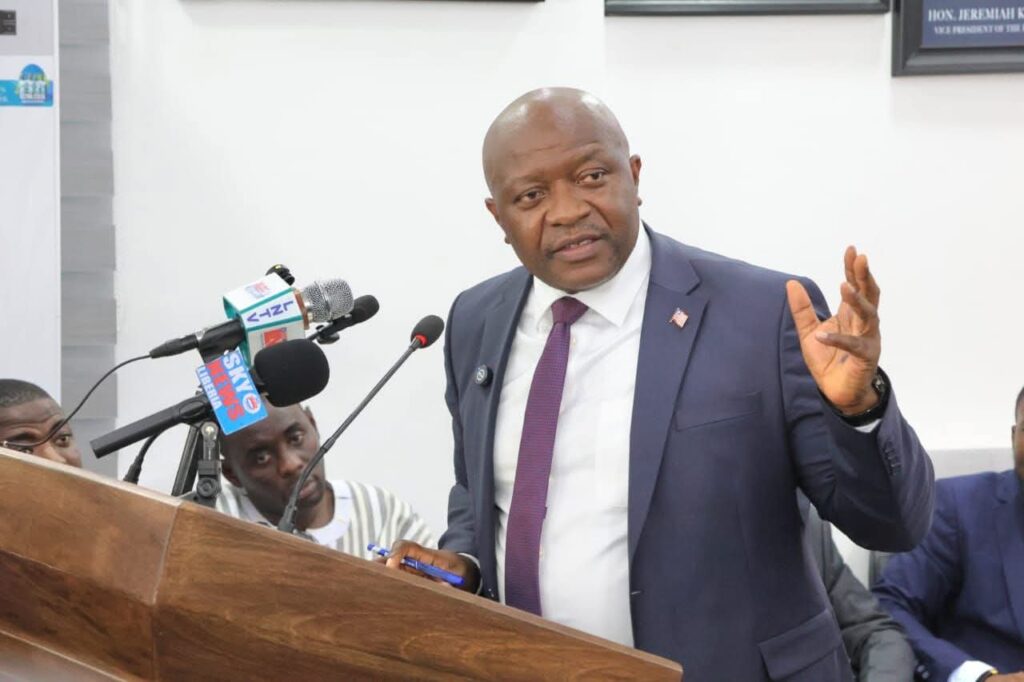By: Julius Konton
Liberia’s Finance and Development Planning Minister, Augustine Kpehe Ngafuan, has announced that the Government of Liberia is placing roads and energy infrastructure at the heart of its historic USD 1.211 billion National Budget, the largest in the country’s history.
Speaking at a special press briefing following the submission of the 2026 National Budget to the National Legislature, Minister Ngafuan stressed that energy and roads remain the two greatest constraints to economic development, and therefore must receive top priority.
“We have made a clear policy decision: roads and electricity are growth accelerators. Prioritizing them is not optional, it is essential,” Ngafuan told journalists.
According to Minister Ngafuan, the total revenue estimate for fiscal year 2026 stands at USD 1.211 billion, of which USD 1.13 billion (94%) will be sourced from domestic revenue.
“This is significant, it shows how much Liberia is doing for itself,” he emphasized.
The Minister also revealed that domestic revenue projections have increased by 47% (USD 333 million) compared to the previous fiscal year.
The government is allocating USD 100 million directly to the two priority sectors:
USD 50 million: Road Infrastructure
This amount is in addition to USD 59 million already allocated for road projects.
USD 50 million: Energy Expansion
Funds directed to the Liberia Electricity Corporation (LEC) to improve electricity distribution, enhance stability during the dry season, expand access, and reduce cost, he added.
“Access to reliable electricity is key for industrialization and economic transformation,” Ngafuan reemphasized.
He told reporters that the Public Sector Investment Program (PSIP) which funds major development projects has jumped from USD 107 million to USD 281 million.
Minister Ngafuan also disclosed that USD 200 million of that amount is expected from ArcelorMittal Liberia’s concession signature bonus.
“These funds are dedicated strictly to transformative projects,” the Minister clarified.
Additionally, more funding will be directed to the counties within the ArcelorMittal operational corridor.
“We are assigning USD 15 million directly to Nimba, Bong, and Grand Bassa, the frontline counties affected by Mittal’s activities,” he said.
Speaking further to journalists he highlighted Budget Revenue Components into three namely Domestic Revenue: USD 1.13 billion, Tax Revenue: USD 79 million and
Non-Tax Revenue: USD 585 million while
Signature Bonus (Mittal): USD 200 million respectively.
At the same time, External Resources: USD 72 million (6%) and Contingent Revenue: USD 28 million, among others.
The Finance Minister also confirmed allocations for key national institutions:
He said educational institutions including the University of Liberia were also highly captured while the Judiciary, covering the construction of additional courts and digitization of court records.
“We are modernizing the justice system. Digitization will reduce case backlogs and enhance transparency,” he noted.
With Liberia already buzzing about the scale and ambition of the budget and others raising concerns over the inclusion and exclusion of certain sectors , the spotlight now shifts from planning to implementation.
Liberians wait to see whether this budget becomes a historical turning point or another political promise.


